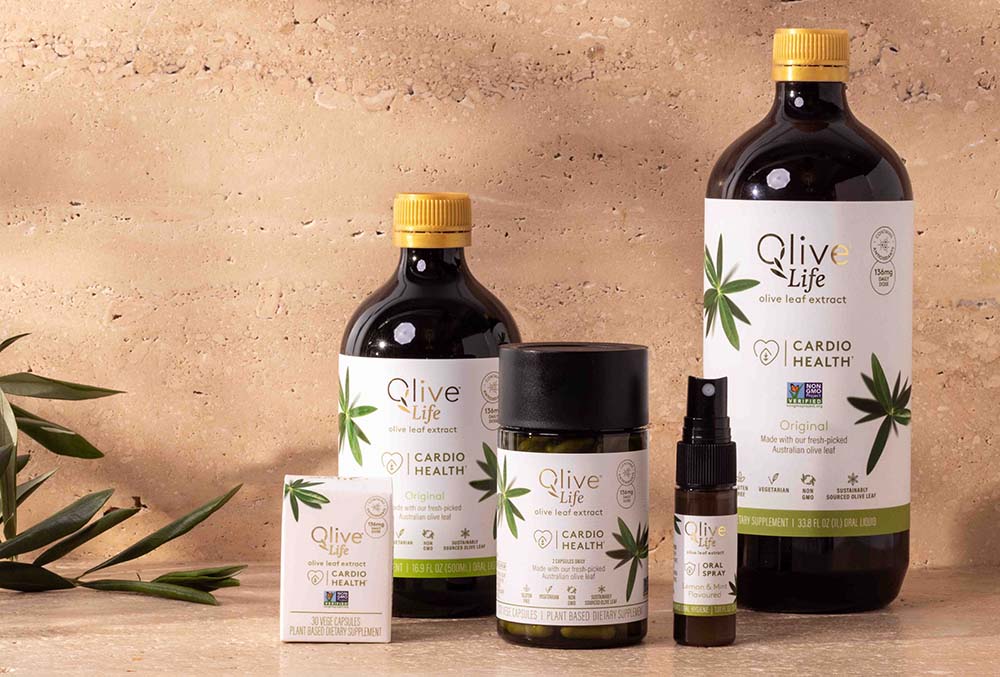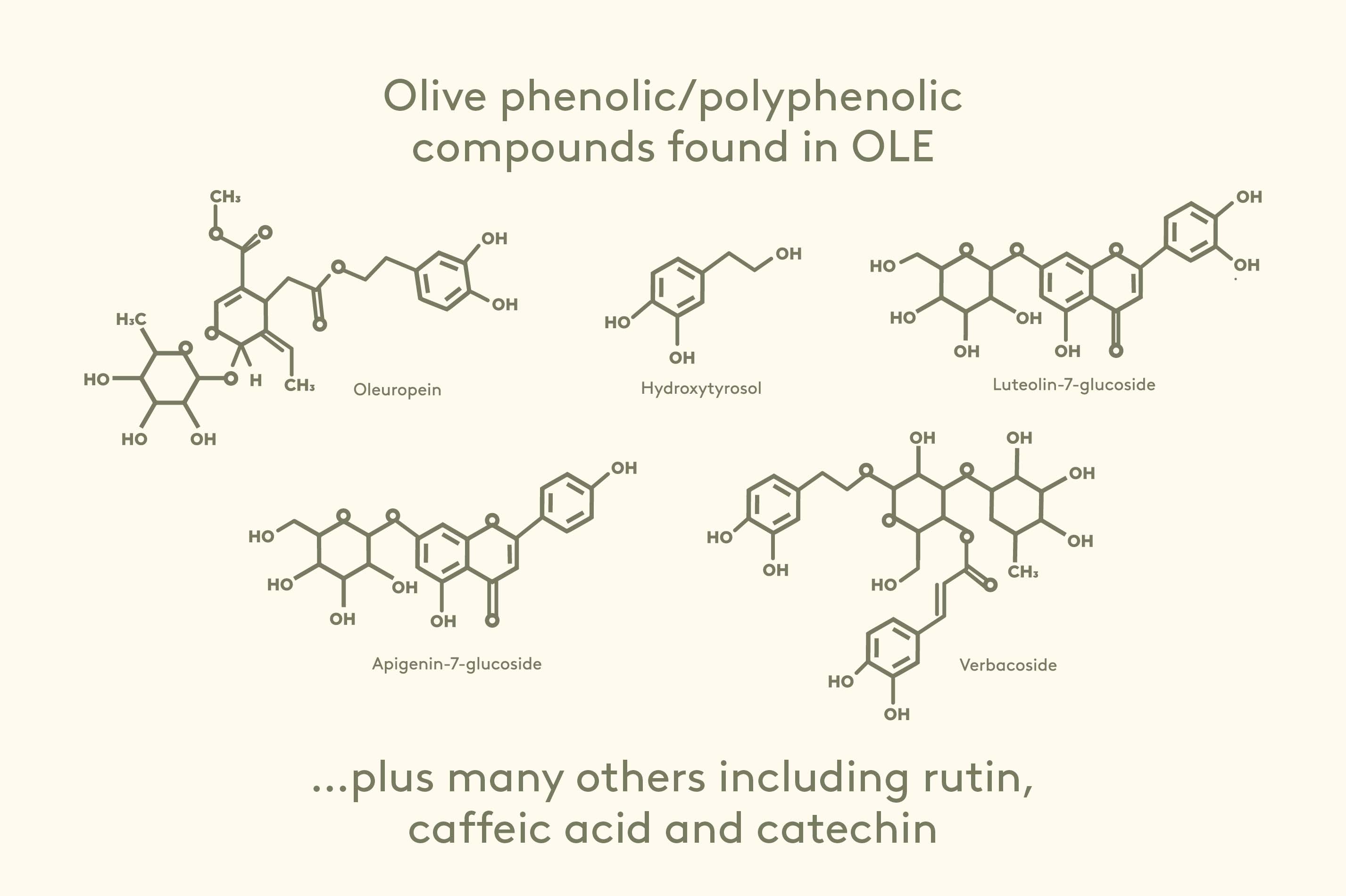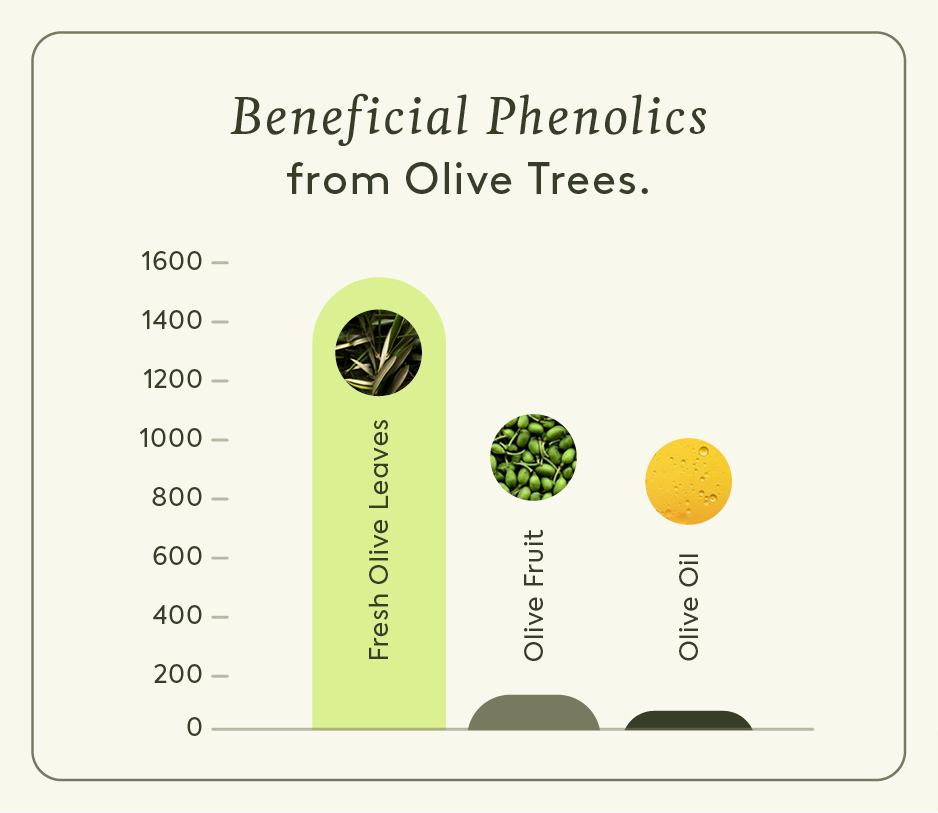
Order Confirmed
We’re sorry, the page you requested could not be found.
Science has a lot to learn from human history. Even though our ancestors used natural ingredients for thousands of years, we’re now only just beginning to understand how these complex natural systems work at a detailed scientific level. And we're learning from the best – Mother Nature herself.
In this blog, we explore the science behind the oleuropein, the key antioxidant compound found in olives, olive oil and olive leaf extract - and explain why it’s nature’s powerful antioxidant.

As its name suggests, olive leaf extract is a concentrated dose of powerful, natural polyphenols, made from the leaves of olive trees. Olive Leaf Extract has been used in traditional medicine for many years for a wide range of health benefits, including supporting cardiovascular health and general wellbeing.¹⁻⁶
Oleuropein is one of the most abundant compounds and the real hero of Olive Leaf Extract. It’s a naturally occurring, plant compound that research has shown to have potent antioxidant, anti-inflammatory and other beneficial bioactive properties.⁷
Several scientific studies have shown that oleuropein and its derivative, hydroxytyrosol, play a key role in Olive Leaf Extract’s health-giving properties, including its role in helping to support the health and function of the cardiovascular system, the maintenance of normal blood pressure, blood sugars and cholesterol, as well as supporting general wellbeing.¹⁻⁶

A vital part of the Mediterranean diet, the humble olive is renowned for its health-giving properties. It’s fruit, oil and leaves contain bioactive plant compounds, including naturally occurring polyphenols that have antioxidant activity.
As its name suggests, olive leaf extract is a potent, concentrated dose of these natural antioxidant polyphenols, made from the leaves of olive trees (in our case, from Olea europaea trees which are rich in polyphenols).
Especially when freshly picked, these little leaves can pack a lot of punch - research shows that taking olive leaf extract can support cardiovascular health, including the maintenance of healthy blood pressure, cholesterol and blood sugar levels. ¹⁻³ Other research shows that the polyphenols found in olive leaf extract can help to support general wellbeing and immunity by combating cellular damage caused by free radicals and oxidative stress that can cause disease.⁴⁻⁶
The most abundant types of polyphenol compounds found in Olive Leaf Extract are oleuropein and its derivative, hydroxytyrosol. Polyphenols have a range of bioactive properties, and are produced by olive trees to help defend themselves from infections and physiological stresses.⁶
The same polyphenol compounds are also found in extra virgin olive oil, which is what gives good-quality oil its dark green colour and delicious, bitter, peppery taste.
Most of us know that extra virgin olive oil has many beneficial health properties, but what you may not know is that fresh olive leaves contain a much higher concentration of these ‘super-polyphenols’ than olive fruit or oil - around 60 times the amount! ⁷⁻⁹
That’s why we use only fresh leaves in our Olive Leaf Extract (and NEVER dried leaves or reconstituted powders), because science has shown us what nature already knows - that fresh is best.

Antioxidants work by neutralising free radicals in the body – the unstable molecules that cause damage to our DNA, cells and tissues. Antioxidants are compounds that donate spare electrons to these unstable molecules, making them more stable and reducing the risk of them causing damage.
A whole range of factors can cause free radical damage in our cells, including normal metabolic processes, stress, ageing, alcohol, cigarette smoke, pollution and sun exposure - which is why it’s important to eat an antioxidant-rich diet and get plenty of exercise and rest.
Scientific studies have shown that Olive Leaf Extract is a powerful antioxidant. In one study, Olive Leaf Extract ranked highest for antioxidant capacity compared with 55 other herbal medicines.10 It’s even higher in antioxidant activity than other well-known antioxidants such as vitamin C and green tea.
In fact, research shows that our Olive Leaf Extract has up to 5 times more potent antioxidant activity than vitamin C.11 So it’s little wonder that more and more health-conscious consumers around the world are turning to this potent, natural plant extract to support both cardiovascular health and general wellbeing.
While some formulations are made from dried leaves, Olive Life Olive Leaf Extract is made only from fresh olive leaves grown on our dedicated olive leaf farms in Queensland, Australia, and fresh-pickedᵀᴹ at sunrise to lock in the naturally occurring plant polyphenols, including our hero oleuropein.
The leaves are water extracted and concentrated on the same day to deliver an optimised dose of 136mg of oleuropein a day, providing a powerful boost of plant-based antioxidants for natural cardiovascular and wellbeing support.¹⁻⁶
Note: The contents of this blog are for educational purposes and are not intended to offer personal medical advice. You should seek the advice of your physician or other qualified health provider if you have any questions regarding a medical condition. Never disregard professional medical advice or delay seeking it because of something you have read on this website.
References
1. Lockyer et al. (2017). Impact of phenolic-rich olive leaf extract on blood pressure, plasma lipids and inflammatory markers: a randomised controlled trial. Eur J Nutr, 56, 1421–1432.
2. Lockyer et al. (2015). Secoiridoids delivered as olive leaf extract induce acute improvements in human vascular function and reduction of an inflammatory cytokine: a randomised, double-blind, placebo-controlled, cross-over trial. Brit J Nutr, 114, 75–83.
3. De Bock et al. (2013). Olive (Olea europaea L.) leaf polyphenols improve insulin sensitivity in middle-aged overweight men: a randomised, placebo-controlled, crossover trial. PLoS ONE, 8, e57622.
4. Omar et al. (2017). Olive (Olea europaea L.) biophenols: a nutriceutical against oxidative stress in SH-SY5Y cells. Molecules, 22, 1858.–93
5. Magrone et al. (2018). Olive leaf extracts act as modulators of the human immune response. Endocr Metab Immune Disord, 18, 85–93–953.
6. Pandey & Rizvi (2009). Plant polyphenols as dietary antioxidants in human health and disease. Oxid Med Cell Longev, 2(5), 270–278.–1432.
7. Silva S, Gomes L, Leitao F et al (2006) Phenolic compounds and antioxidant activity of Olea europaea L. fruits and leaves. Food Sci Tech Int 12:385–395 7.
8. Kountouri AM, Mylona A, Kaliora AC et al (2007) Bioavailability of the phenolic compounds of the fruits (drupes) of Olea europaea (olives): impact on plasma antioxidant status in humans. Phytomedicine 14:659–667 8
9. Owen RW, Mier W, Giacosa A et al (2000) Phenolic compounds and squalene in olive oils: the concentration and antioxidant potential of total phenols, simple phenols, secoiridoids, lignans and squalene. Food Chem Toxicol 38:647–659. doi:10.1016/ S0278-6915(00)00061-2
10. Wojcikowski et al. (2007). Antioxidant capacity of 55 Medicinal Herbs Traditionally used to treat the urinary system: A comparison using a sequential three-solvent extraction process. The Journal of Alternative and Complementary Medicine, 13, 103-109

We’re sorry, the page you requested could not be found.